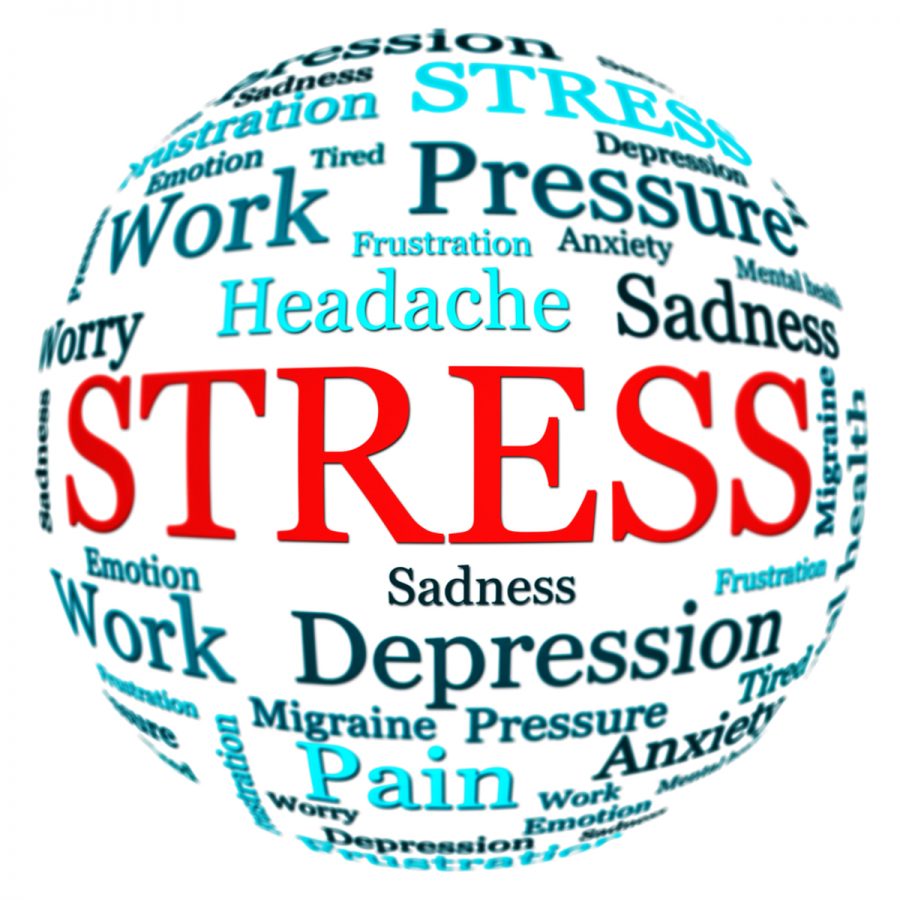By Ruth Kramer ’18 News Editor
It’s 11 o’ clock on a Tuesday night and you still have to study for your physics test, fill out three Pre-AP French worksheets, and finish your essay for Mrs. Dunn’s Honors English class. Your heart starts beating uncontrollably, your hands get sweaty, and you can’t seem to concentrate. You are under stress.
We all experience stress at some point of another, big or small, important or not. A slightly stressful situations such as deciding where to go to dinner next Saturday, but there are also more stressful situations, such as choosing what college to go to. Studies show that some amounts of stress are good. There is a range of stress that still pushes you to make decisions without worrying too much about what you’ve decided to do. Stress is a small boost in the body that can push you to meet goals you have set for yourself. Stress also triggers the “fight or flight response” that is responsible for keeping you alive. Think of all the times that a kid on roller skates has come at you and you’ve darted out of the way or if you’ve been called out to answer a difficult question in front of a classroom full of people. Now think about what you’ve done in those situations, whether you’ve grabbed the handles of the bike or asked to get a drink of water before answering the question—you’ve fought or you flew. That is good stress; its stress that has kept you alive and has made you react in a safe, understandable way.
But, where there is good, there is also bad. When you are under extreme amounts of pressure, such as 4-5 hours of homework a night or your first test drive with your learner’s permit. This kind of stress can actually be harmful to your body. If you are constantly under a crushing amount of stress and have no ways of alleviating it, stress could do more than you keep you up late at night. Too much stress could increase your chances of getting minor infections such as colds and the flu, it could produce painful migraines, or dramatically decrease your appetite; not to mention long term effects such as anxiety and depression, as well as heart disease and even type 2 diabetes. Stress is a serious thing that can lead to major consequences.
But fear not. Just because you get stressed out doesn’t instantly mean that you’re going to have a heart attack when your 60. Stress is also your body’s way of telling you to slow down and relax a little. One of the best ways to alleviate stress is to get some fresh air by taking a small walk outside. Vitamin D (which comes from the sun) is said to be good for you because it releases a chemical in your body that makes you happier. Another way is to sit and talk it out; feeling like someone else understands the pressure your under can give you a piece of mind. A highly recommended form of reducing stress is to get out of your head by putting your energy into your body. This could be knitting, drawing, reading, whatever it takes to remove your thoughts from the stressful situation. Your stress reliever could be very different than someone else’s—your friend could alleviate their stress by going for a run, your cousin could relax by knitting scarfs, and you could calm down by taking a mental break and watching your favorite TV show for an hour. Do whatever makes you breathe normally again, but make sure it’s safe. There is (of course) a good and bad way to deal with stress. Some people deal with their stress by eating their feelings away, completely ignoring the problems causing their stress, or they turn to even worse alternatives, such as drugs and alcohol, to make them forget their stress. Everyone stresses out, it’s human nature to worry about things, but when you try to alleviate some of that pressure from yourself, make sure you’re doing it in a natural and healthy way such as talking, listening to music, or taking a walk through your neighborhood.
Stress is hard to deal with, especially as a teenager. You want to go out with your friends, play two sports a year, and get all A’s this year. Sometimes we feel like it amounts to just be too much, but those are the times that we must step back and re-evaluate what’s important. The last major thing about stress, perhaps the biggest, is deciding when to put something new on your plate or skip it until next time. At the end of the day, it’s up to you—what classes you take, what sports you play, what clubs you join. This is yet another thing that stress can be useful for. Stress can help you see what you want to be stressed out about. If your spring sport left you ripping out your hair with anxiety about finals, than it may help you see that the sport isn’t worth the pressure for you. If your honors math class is just bringing you down (and you don’t even like math), than maybe you’ll decide what classes are really important to you. Yes, stress can be hard to deal with and it can make you go crazy sometimes, but stress can also be beneficial. Stress makes you react, makes you try, makes you decide. Without stress, where would we be? We wouldn’t have felt the need to find out that the world isn’t flat, we wouldn’t have thought it important to know why dinosaurs still don’t roam the earth, we wouldn’t have thought that our freedoms could be so important. So yes, now we suffer through our worksheets and feel the pressure of our tests, but at the end of the day, our stressful decisions will get us where we want to go.
Sources:
http://www.healthline.com/health/stress/effects-on-body
http://www.helpguide.org/articles/stress/stress-symptoms-causes-and-effects.htm
http://www.health.com/health/gallery/0,,20765943_2,00.html
Image Source: https://www.google.com/search?q=stress&biw=1377&bih=888&source=lnms&tbm=isch&sa=X&ved=0CAcQ_AUoAmoVChMI0-Xm74m-yAIViBw-Ch18gALG#imgrc=OdoOVnbPLcFtgM%3A









